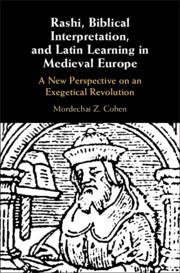 Rashi, Biblical Interpretation, and Latin Learning in Medieval Europe
Rashi, Biblical Interpretation, and Latin Learning in Medieval Europe Book contents
- Rashi, Biblical Interpretation, and Latin Learning in Medieval Europe
- Rashi, Biblical Interpretation, and Latin Learning in Medieval Europe
- Copyright page
- Dedication
- Contents
- Acknowledgments
- Abbreviations
- Introduction
- 1 A New Program of Peshat (“Plain Sense” Exegesis)
- 2 “Settling” the Words of Scripture Using Midrash
- 3 St. Bruno on Psalms: Precedent for Rashi?
- 4 Comparison to the Andalusian Exegetical School
- 5 Comparison to the Byzantine Exegetical School
- 6 Rashi’s Literary Sensibilities and Latin Grammatica
- 7 Rashi’s Notion of “the Poet” (ha-Meshorer) in the Latin Context
- 8 Joseph Qara and Rashbam: Peshat Legacy in Northern France
- 9 Literary Sensibilities of Peshat within a Latin Context
- Bibliography
- General Index
- Index of Scriptural References
- Index of Rabbinic Sources
3 - St. Bruno on Psalms: Precedent for Rashi?
Published online by Cambridge University Press: 15 April 2021
- Rashi, Biblical Interpretation, and Latin Learning in Medieval Europe
- Rashi, Biblical Interpretation, and Latin Learning in Medieval Europe
- Copyright page
- Dedication
- Contents
- Acknowledgments
- Abbreviations
- Introduction
- 1 A New Program of Peshat (“Plain Sense” Exegesis)
- 2 “Settling” the Words of Scripture Using Midrash
- 3 St. Bruno on Psalms: Precedent for Rashi?
- 4 Comparison to the Andalusian Exegetical School
- 5 Comparison to the Byzantine Exegetical School
- 6 Rashi’s Literary Sensibilities and Latin Grammatica
- 7 Rashi’s Notion of “the Poet” (ha-Meshorer) in the Latin Context
- 8 Joseph Qara and Rashbam: Peshat Legacy in Northern France
- 9 Literary Sensibilities of Peshat within a Latin Context
- Bibliography
- General Index
- Index of Scriptural References
- Index of Rabbinic Sources
Summary
The techniques of grammar and rhetoric – the language arts of classical learning – had long played an integral role in Christian Bible interpretation and were a central part of the curriculum of the cathedral schools. Grammar, the first of the liberal arts, encompassed a range of reading skills and prominently included enarratio poetarum (i.e., interpreting the poets). As the important Carolingian theologian and Bible interpreter Rabanus Maurus (c. 780–856) remarked, “grammar (grammatica) is the science of interpreting the poets” and it is “the origin and foundation of the liberal arts.” This echoes Quintillian’s characterization of the dual purpose of grammar: recte loquendi scientia (the science of speaking correctly) and poetarum enarratio (the art of interpreting poets), a dual characterization that would be repeated throughout the Middle Ages. (In Hebrew and Arabic learning, by contrast, the discipline of grammar – termed diqduq/dayyaqut and al-naḥw, respectively – was more sharply circumscribed and focused on phonology, morphology, and syntax, all of which might be subsumed under recte loquendi scientia.) The language arts of grammar and rhetoric flourished anew in the eleventh century in the cathedral schools of northern France, a wave of learning in which Bruno the Carthusian played a key role.
- Type
- Chapter
- Information
- Rashi, Biblical Interpretation, and Latin Learning in Medieval EuropeA New Perspective on an Exegetical Revolution, pp. 79 - 101Publisher: Cambridge University PressPrint publication year: 2021


